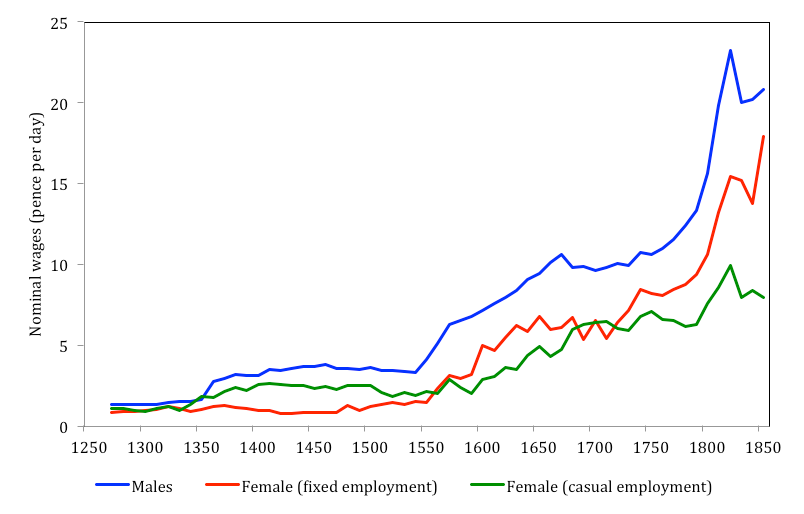If you are paid less than your colleagues for your work you need to get a pay rise. If you do all the low paid stuff your colleagues can’t be bothered with, you need to change. You don’t have to! This post will help you give the gender pay gap a finger and get the pay rise you deserve.
Lately, there has been a lot written about the gender pay gap. There were reports that 78% of companies in the UK still pay women less than men. Data doesn’t tell us whether men are paid more for the same work, which incidentally would be illegal in the UK because we have the Equal Pay Act of 1970, but we know that men make up most of the higher paid jobs.
Heck, universities pay women less and they are supposed to be ‘a civilising force of enlightened and ethical practice’. My university, The University of Manchester, pays women 13% less than men; we, friend, are one of the 78% of companies with a pay gap that favours men. (You can check where your employer is in this shameful statistic here.)
Yep, this is a problem. Don’t know about you but hearing about the gender pay gap makes my blood boil like a witch’s cauldron.
Do you know how far back evidence of the gender pay gap goes?
As you can see, it has gone on a very long time.
This graph, is from an article on the wages of women in England 1260-1850 by Jane Humphries (University of Oxford) and Jacob Weisdorf (University of Sothern Denmark). It looks like the wages of men and women in casual employment were similar only for a very brief period around 1350 (and for all we know this may be a historical bleep).
For most of our history the gender gap has persisted. Correcting it is important but is likely take longer than I have left on this Earth and a cultural shift off the Richter scale.
Hence, instead of a call to arms and revolution, I’ll give you some pointers to help you defy the gender gap at personal level and get the pay rise you deserve.
How do I know about that?
Well, did you think that, being a business school professor, I’m immune to all this? I’m not. Where I’m different is that I took the actions to bridge the gap and get a pay rise.
How I found that I earn significantly less than other professors in my unit?
I was heading a large academic unit of over 100 people; approximately 80 academics.
One day, I received an e-mail from my boss saying that I should look at the attached spreadsheet and check that there were no obviously underpaid members of staff in my unit.
Guess what I found?
Yep, you guessed it. There was one severely underpaid person in my academic unit: me. Looking at the salaries of other professors I realised I earn nearly £8,000 per year less than the next on the list.
How did I feel about it?
I was so cross, I thought my piss is turning into petrol. I’m still not sure, three years later, whether I was cross with ‘the establishment’ or with myself. Both, I suppose.
How I got a pay rise
I remember sitting at a lunch for female professors at my place and listening to colleagues say things like:
‘I really don’t like talking about money but…’
‘It is not about the money but…’
What? I talk about money all the time. And I’ll tell you what: it is about the money.
I talk about money, and believe that it is about money, because how much we are paid is an expression of the value our employer places on our work.
By underpaying women employers are effectively saying that the work we do is not as valuable as the work men.
This is offensive to everyone concerned.
Hence, after I realised that my university doesn’t seem to value my contribution as much as the contribution of other next professors, I decided to speak up. I decided that I’ll argue my case calmly, as befits my erudite nature.
I spoke up and I got the pay rise I deserve.
This is how I did it and you could do it as well; you just ought to follow these steps.
How to get the pay rise you deserve?

Here are the steps that will make your case for getting the pay rise you deserve unbreakable.
Which group are you in?
There are two things that bring about the gender pay gap:
- Being paid less for the same work
- Doing less well-paid work
Where do you fit?
(Thought you may wish to know that I was in the first group. Which, given my occupation, experience and meritocratic convictions of fairness is scandalous, I know.)
Okay, now we know this, let me tell you:
It doesn’t matter which group you fall in; you must ask!
Yes, you must have the confidence to ask and the patience to wait for the right time.Also the conditions under which you are asking will be different.
If you are being paid less for the same work:
Don’t build your case on fairness
Fairness is important. Heck, fairness, and fair play, are critical to the workings of our society and economy – after all, if you run as fast as Husain Bolt you expect to win with him, right?
Understandably, it is frustrating to know that you are paid less for the same work than your male colleagues (or anyone for that matter). Your sense of fairness is offended and your sense of worth materially damaged.
Hence, it is very tempting to go to your manager stating that being paid less is simply not fair. Between you and me, this is the first thing I wanted to do: being paid less than the next professor on the salary scale (yes, he happened to be a man) was a gross injustice and an insult.
Still, when I started framing my case a vision of a toddle in a full flight tantrum, stomping her little feet and shouting that ‘it is just not fair’ popped into my mind.
Behaving like a toddle scorned is unlikely to get you a pay rise. Remember what your mother said when you told her it is not fair to be asked to do the washing up? Mine reminded me that the world is not fair.
You don’t want your manager to see you as a petulant child and remind you that the grown-up world is not fair when you are standing up for your labour rights; trust me.
(I changed tactics immediately the vision popped into my mind.)
You can use the legal route
Most employers have well set out job descriptions.
If you are a nurse, you have a set of duties you perform. You may be male, female or anything on a scale between, but the work you do should be the same. (Yes, there are levels of seniority as well, but these are also easy to pinpoint.)
Having these job descriptions (or any list of duties, expectations etc.) will make it easy for you to compare ‘input’ and ‘reward’ between your colleagues and yourself.
Were you to find that for the same ‘input’ your colleague is being rewarded much more handsomely, you go with the evidence to your supervisor.
No need to raise your voice or issue threats: your supervisor/manager knows very well they are breaking the 1970 Equal Pay Act. (If they don’t know that, go further up.)
Things may get ugly but if you have all the evidence you are likely to win an employment tribunal. (Most cases won’t get to tribunal since this involves loss of reputation for the employer.)
You can use the ‘value’ route
This is when you get the pay rise you deserve because there is evidence you contribute to your employer’s business value that is far greater than what they are paying you know.
When you make your case for a pay rise based on the value you contribute, the you are not saying that you should earn as much, or more, than someone else but that you are worth more absolutely.
If you are doing less well-paid work:
If you have followed the some of the responses to the gender pay gap issue bosses gave, they included statements that women are quite happy to work in lower paid occupations and levels; in other words, that it is our own fault.
Do you like to work lower paid jobs? Really?
You ought to garner the confidence to put your head above the parapet and apply for promotion. Applying for promotion to get the pay rise you deserve has elements of the value-based strategy from the previous section.
You could brush up on how to increase you value on the labour market. In brief, to increase your value in the eyes of your employer and get the pay rise you deserve:
- Specialise;
- Develop competencies that are rare and needed;
- Become the best in your niche;
- Move around or at the very least test the market;
- Associate with the best in your area of specialism (yes, most of us are not stars, we are planets).
Which route did I take to get a pay rise?
I had to apply for a promotion and used the ‘value’ route.
(Yes, promotion. My university introduced these different levels for full Professors and to move from one to the other you apply for promotion though it is lighter touch than the rest of promotions.)
For me, this was the easiest one, mind. In academe, arguing your relative worth is hard. Because there is no standardisation – both research and teaching are creative endeavours thriving on difference – direct comparison with what someone else is doing is always problematic.
Making a case around your value for the organisation, on the other hand, is not problematic (to a degree, this is because universities have been working very hard to develop transparent system of work allocation and promotion criteria).
My ‘value’ case was so strong that I doubt you could cut it with a diamond.
Still, my bosses came back with an offer far below what I asked.
I refused with the calm determination of someone who has nothing to lose. Several hours later, I got the pay rise I thought I deserve.
Finally…
It looks like the gender pay gap has a long history and will be hard to shift. Still, it is an affront not only to women but men as well – injustice is not gendered.
When faced with an injustice, we could start tackling it by attacking the principle or by fighting the practice. What does this mean?
This means that we can write about the gender pay gap and argue that it is wrong until the media turns its attention to something sexier: we’d change little. Or we can look at our pay, compare it with the pay of those around us and, were we to find a negative discrepancy, take the steps set out above to change the situation.
Fight the gender pay gap and get the pay rise you deserve, I say, one woman (or man) at the time. The time to stop putting up with it has come!
